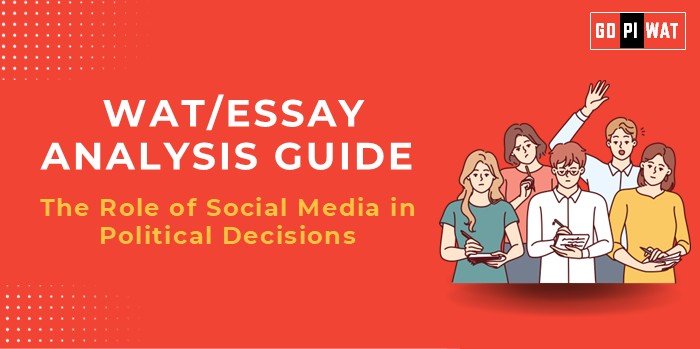📋 Written Ability Test (WAT)/Essay Analysis Guide
🌐 Understanding the Role of Social Media in Political Decisions
💡 Social media bridges citizens and governments, but it also raises critical ethical and regulatory questions. B-school students should analyze its economic, societal, and global implications.
📝 Effective Planning and Writing
- ⏳ Time Allocation:
- 📋 Reading & Planning: 5 minutes
- ✍️ Writing: 20 minutes
- 🔍 Review: 5 minutes
- 📖 Preparation Tips: Note impactful statistics and relevant case studies.
✨ Introduction Techniques for Essays
- ⚖️ Contrast Approach:
“While social media democratizes political participation, its unregulated nature risks undermining democracy itself.”
- 📜 Historical Approach:
“From the Arab Spring to 2024, social media has become a battleground for political ideologies.”
📚 Structuring the Essay Body
- 🏆 Achievements: Highlight successful mobilizations like #BlackLivesMatter.
- ⚠️ Challenges with Comparative Analysis: Examine misinformation through global examples like the 2016 U.S. elections.
- 🌟 Future Outlook: Suggest regulatory frameworks, such as AI-driven content moderation.
📄 Concluding Effectively
- 🤝 Balanced Conclusion:
“Social media is both a catalyst for participation and a challenge to governance, demanding nuanced regulation.”
- 🌍 Future-Oriented Conclusion:
“The future of social media in politics depends on achieving balance between freedom of expression and content accountability.”
✍️ Sample Short Essays
⚖️ Balanced Perspective
“Social media’s influence on politics is both a boon and a bane. Its ability to democratize participation must be weighed against the risks of misinformation and manipulation.”
🔧 Solution-Oriented
“AI-driven solutions and civic education can harness social media’s potential while curbing its misuse.”
🌍 Global Comparison
“While social media empowered movements like the Arab Spring, it also challenges democracies, as seen in election interference worldwide.”


